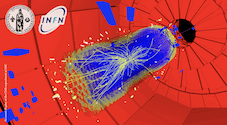Speaker
Dr
Stefano Bettarini
(Università di Pisa and INFN)
Description
The SuperB asymmetric e+e- collider has been recently approved
by the Italian Government and within few years with a luminosity two orders of magnitude greater than past B-Factories, it is expected to
start the study of rare B and D meson decays, where New Physics might show up, and lepton flavour violation in tau decays, profiting from polarized beam.
Due to the reduced center of mass boost, the vertex resolution must be
improved to achieve the same proper-time difference resolution for B
decays obtained in BaBar.
Thus, based on the layout of the BaBar vertex detector, the SuperB
Silicon Vertex Tracker must be equipped with an extra innermost Layer0,
very close to the interaction point.
The most stringent physics requirements concern the low material budget
and the high-background working conditions of the Layer0: striplets modules,
with short strips on high resistivity silicon sensors, are the baseline
solution for the beginning of data taking; an upgrade to pixel sensors,
more robust against background occupancy, is foreseen at the full luminosity.
The latest results on the various pixel options explored by a specific
R&D program on different pixel technologies will be described: CMOS MAPS,
pixel sensors realized on multiple layers with a vertical integration technology
and hybrid pixels.
Author
Dr
Stefano Bettarini
(Università di Pisa and INFN)

